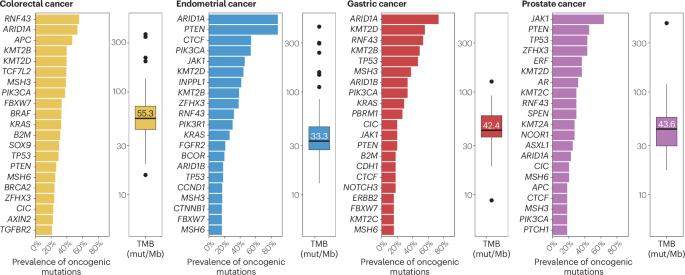Epidemiology, pathogenesis, biology and evolving management of MSI-H/dMMR cancers
IF 82.2
1区 医学
Q1 ONCOLOGY
引用次数: 0
Abstract
Deficiency in DNA mismatch repair (dMMR) is a common pathway of carcinogenesis across different tumour types and confers a characteristic microsatellite instability-high (MSI-H) molecular phenotype. The prevalence of the MSI-H/dMMR phenotype is highest in endometrial and colorectal cancers, and this phenotype is associated with a distinct tumour biology, prognosis and responsiveness to various anticancer treatments. In a minority of patients, MSI-H/dMMR cancers result from an inherited pathogenic variant in the context of Lynch syndrome, which has important implications for familial genetic screening. Whether these hereditary cancers have a different biology and clinical behaviour to their sporadic counterparts remains uncertain. Interest in this tumour molecular subtype has increased following the discovery of the high sensitivity of metastatic MSI-H/dMMR cancers to immune-checkpoint inhibitors (ICIs) in a histology-agnostic manner, which reflects the genomic hypermutation resulting from dMMR that renders these tumours highly immunogenic and immune infiltrated. This vulnerability is now also being exploited in early stage disease settings. Despite this common biological foundation, different MSI-H/dMMR cancers have histotype-specific features that correspond to their particular cell or tissue of origin, which might be associated with differences in prognosis and sensitivity to ICIs. In this Review, we provide an overview of the epidemiology, biology, pathogenesis, clinical diagnosis and treatment of MSI-H/dMMR tumours as a histology-agnostic cancer phenomenon. We also highlight peculiarities associated with specific pathogenetic alterations and histologies of MSI-H/dMMR tumours. Tumours with deficient DNA mismatch repair (dMMR) leading to a microsatellite instability-high (MSI-H) phenotype are characterized by a high burden of immunogenic mutations and, thus, an immunological ‘hot’ microenvironment that is associated with high sensitivity to immune-checkpoint inhibitors. In this Review, the authors discuss the epidemiology, biology, pathogenesis, clinical diagnosis and treatment of MSI-H/dMMR tumours, highlighting idiosyncrasies associated with specific pathogenetic alterations and tumour histologies.


MSI-H/dMMR癌症的流行病学、发病机制、生物学和进化管理
DNA错配修复(dMMR)缺陷是不同肿瘤类型中致癌的常见途径,并赋予其特有的微卫星不稳定性高(MSI-H)分子表型。MSI-H/dMMR表型的患病率在子宫内膜癌和结直肠癌中最高,并且这种表型与不同的肿瘤生物学、预后和对各种抗癌治疗的反应性相关。在少数患者中,MSI-H/dMMR癌症是由Lynch综合征背景下的遗传致病性变异引起的,这对家族遗传筛查具有重要意义。这些遗传性癌症是否与散发性癌症具有不同的生物学和临床行为仍不确定。在发现转移性MSI-H/dMMR癌症对免疫检查点抑制剂(ICIs)具有组织学不确定的高敏感性之后,人们对这种肿瘤分子亚型的兴趣增加了,这反映了dMMR导致的基因组高突变,使这些肿瘤具有高度免疫原性和免疫浸润性。这一脆弱性现在也在早期疾病环境中被利用。尽管有这种共同的生物学基础,不同的MSI-H/dMMR癌症具有与其特定的细胞或组织起源相对应的组织型特异性特征,这可能与预后和对ICIs敏感性的差异有关。本文综述了MSI-H/dMMR肿瘤的流行病学、生物学、发病机制、临床诊断和治疗等方面的研究进展。我们还强调了与MSI-H/dMMR肿瘤的特定病理改变和组织学相关的特点。
本文章由计算机程序翻译,如有差异,请以英文原文为准。
求助全文
约1分钟内获得全文
求助全文
来源期刊
CiteScore
99.40
自引率
0.40%
发文量
114
审稿时长
6-12 weeks
期刊介绍:
Nature Reviews publishes clinical content authored by internationally renowned clinical academics and researchers, catering to readers in the medical sciences at postgraduate levels and beyond. Although targeted at practicing doctors, researchers, and academics within specific specialties, the aim is to ensure accessibility for readers across various medical disciplines. The journal features in-depth Reviews offering authoritative and current information, contextualizing topics within the history and development of a field. Perspectives, News & Views articles, and the Research Highlights section provide topical discussions, opinions, and filtered primary research from diverse medical journals.

 求助内容:
求助内容: 应助结果提醒方式:
应助结果提醒方式:


